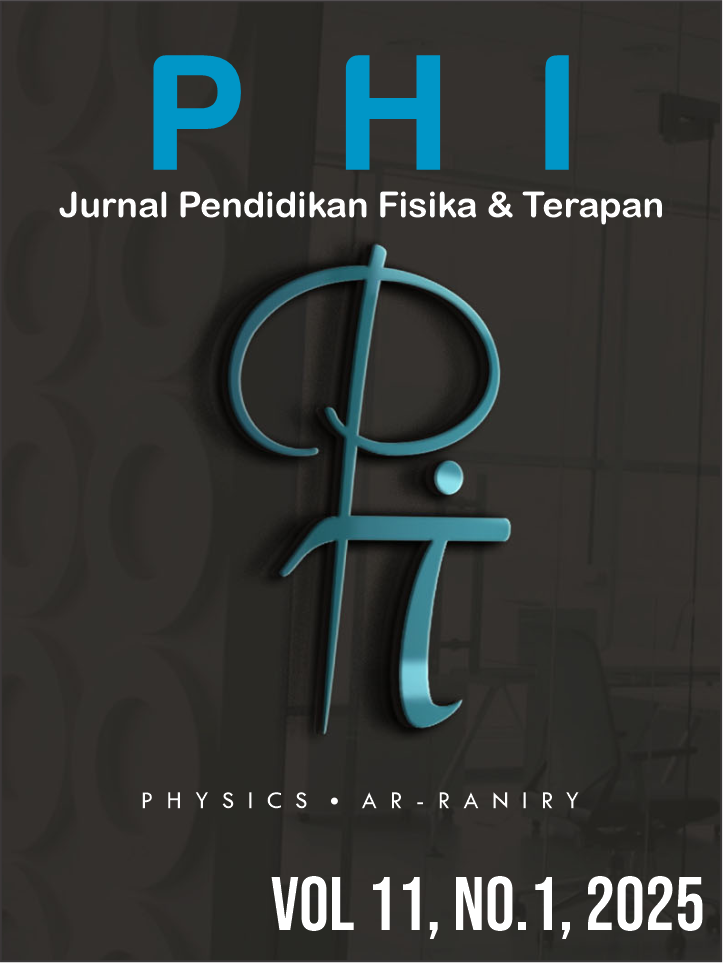Analysis of Outcome-Based Education Curriculum Implementation: Focus of Study on Classical Mechanics Course
DOI:
https://doi.org/10.22373/p-jpft.v11i1.25857Keywords:
Kurikulum, outcome-based education, mekanika klasikAbstract
The adoption of Outcome Based Education (OBE) curriculum in universities in Indonesia has been carried out massively, but in some cases, the implementation of OBE has not been carried out optimally, including in Classical Mechanics courses. The purpose of this study was to analyze (1) the suitability of the RPS document to the demands of Outcome-Based Education, (2) the implementation of lectures, (3) lecture evaluation mechanisms, and (4) the difficulties still experienced by students in the Classical Mechanics course. This research was conducted on 3 lecturers teaching Classical Mechanics courses and 64 undergraduate students of Physics Education at one of the universities in Malang. Data were collected through learning observation, interviews, surveys, and document analysis. Qualitative data analysis techniques using Miles & Huberman analysis techniques. The results showed that in general the implementation of the OBE-based curriculum in the Classical Mechanics course was good but there needed to be some improvements both in the RPS, learning implementation, and learning evaluation. On the other hand, there are still many difficulties experienced by students in understanding topics in Classical Mechanics lectures.References
Asim, H. M., Vaz, A., Ahmed, A., & Sadiq, S. (2021). A Review on Outcome Based Education and Factors That Impact Student Learning Outcomes in Tertiary Education System. International Education Studies, 14(2), 1. https://doi.org/10.5539/ies.v14n2p1
Asmawi, M. R. (2005). Strategi Meningkatkan Lulusan Bermutu Di Perguruan Tinggi. Makara Human Behavior Studies in Asia, 9(2), 66. https://doi.org/10.7454/mssh.v9i2.124
Clear, A., Clear, T., Vichare, A., Charles, T., Frezza, S., Gutica, M., Lunt, B., Maiorana, F., Pears, A., Pitt, F., Riedesel, C., & Szynkiewicz, J. (2020). Designing Computer Science Competency Statements: A Process and Curriculum Model for the 21st Century. In Annual Conference on Innovation and Technology in Computer Science Education, ITiCSE. https://doi.org/10.1145/3437800.3439208
Fajriati, R., Na’imah, N., Hibana, H., Putro, K. Z., & Labziah, L. (2022). Pola Komunikasi dalam Proses Pembelajaran di Masa Pandemi Covid-19. Jurnal Obsesi : Jurnal Pendidikan Anak Usia Dini, 6(5), 3877–3888. https://doi.org/10.31004/obsesi.v6i5.1730
Gultom, I. A., & Daulay, S. F. (2024). Pengaruh penggunaan model pembelajaran reflektif dalam kemampuan menulis teks cerpen pada siswa kelas XI SMA Negeri 4 Pematangsiantar. Pediaqu:Jurnal Pendidikan Sosial Dan Humaniora, 3(2), 516–529.
Gunawan, G., Harjono, A., Suranti, N. M. Y., Herayanti, L., & Imran, I. (2021). The impact of learning management system implementation on students’ understanding of mechanics concepts. Journal of Physics: Conference Series, 1747(1), 0–7. https://doi.org/10.1088/1742-6596/1747/1/012020
Hidayati, R. A., & Taqwa, M. R. A. (2023). Computer Based Recitation Program Development With Feed Back i n Newton’s Law Topic. International Journal of Education and Teaching Zone, 2(1), 113–129. https://doi.org/https://10.57092/ijetz.v2i1.49
Lestari, P. E., Purwanto, A., & Sakti, I. (2019). Pengembangan instrumen tes keterampilan pemecahan masalah pada konsep usaha dan energi di SMA. Jurnal Kumparan Fisika, 2(3), 161–168. https://doi.org/10.33369/jkf.2.3.161-168
Leyvraz, F. (2015). Understanding rigid body motion in arbitrary dimensions. European Journal of Physics, 36(3), 1–17. https://doi.org/10.1088/0143-0807/36/3/035021
Mony, H., Lusianawati, H., & Lenoardi, A. (2022). Dampak Implementasi Kebijakan Merdeka Belajar Kampus Merdeka pada Learning Outcome Program Studi Ilmu Komunikasi. Warta Ikatan Sarjana Komunikasi Indonesia, 4(02), 125–133.
Mutsvangwa, A. (2020). A study of student teachers’ misconceptions on uniform circular motion. Journal of Physics: Conference Series, 1512(1). https://doi.org/10.1088/1742-6596/1512/1/012029
Muzakir, M. I., & Susanto. (2023). Implementasi Kurikulum Outcome Based Education (Obe) Dalam Sistem Pendidikan Tinggi Di Era Revolusi Industri 4.0. Edukasiana: Journal of Islamic Education, 2(1), 118–139. https://doi.org/10.61159/edukasiana.v2i1.86
Pals, F. F. B., Tolboom, J. L. J., & Suhre, C. J. M. (2024). Formative Assessment Strategies by Monitoring Science Students’ Problem-Solving Skill Development. Canadian Journal of Science, Mathematics and Technology Education, 0123456789. https://doi.org/10.1007/s42330-023-00296-9
Pare, A., & Sihotang, H. (2023). Pendidikan Holistik untuk Mengembangkan Keterampilan Abad 21 dalam Menghadapi Tantangan Era Digital. Jurnal Pendidikan Tambusai, 7(3), 27778–27787.
Ploetzner, R., Lippitsch, S., Galmbacher, M., & Heuer, D. (2006). Students’ difficulties in learning physics from dynamic and interactive visualizations. ICLS 2006 - International Conference of the Learning Sciences, Proceedings, 2, 550–556.
Ploetzner, R., Lippitsch, S., Galmbacher, M., Heuer, D., & Scherrer, S. (2009). Students’ difficulties in learning from dynamic visualisations and how they may be overcome. Computers in Human Behavior, 25(1), 56–65. https://doi.org/10.1016/j.chb.2008.06.006
Prasetyo, A., Santosa, S., & Marjono, M. (2014). Penerapan Model Pembelajaran Reflektif pada Pembelajaran Biologi terhadap Hasil Belajar Siswa Kelas X SMA Negeri Colomadu Tahun Pelajaran 2012/2013. BIO-PEDAGOGI, 3(1), 1. https://doi.org/10.20961/bio-pedagogi.v3i1.5308
Purwanto, A., Putri, D. H., & Hamdani, D. (2021). Penerapan Project Based Learning Model Untuk Meningkatkan Sikap Ilmiah Mahasiswa Dalam Rangka Menghadapi Era Merdeka Belajar. Jurnal Kumparan Fisika, 4(1), 25–34. https://doi.org/10.33369/jkf.4.1.25-34
Puspitasari, N. A., & Sastromiharjo, A. (2021). Permendikbud Implementation No. 3 Year 2020 in the Preparation of Indonesian Course Lesson Plan. Hortatori : Jurnal Pendidikan Bahasa Dan Sastra Indonesia, 5(1), 71–78. https://doi.org/10.30998/jh.v5i1.622
Rao, N. J. (2020). Outcome-based Education: An Outline. Higher Education for the Future, 7(1), 5–21. https://doi.org/10.1177/2347631119886418
Safriana, S., & Fatmi, N. (2018). Analisis Miskonsepsi Materi Mekanika pada Mahasiswa Calon Guru Melalui Force Concept Inventory dan Certainty of Response Index. Jurnal Pendidikan Sains Indonesia, 6(2), 90–94. https://doi.org/10.24815/jpsi.v6i2.11897
Sardi, J., Habibullah, H., Gistituati, N., Betri, A., & Yuliana, D. F. (2024). Analisis Dokumen dan Implementasi Kurikulum Merdeka Belajar Kampus Merdeka di Universitas Negeri Padang: Studi Kasus Teknik Elektro Industri. Jurnal Pendidikan Teknik Elektro, 5(1), 34–43.
Sari, B. W., & Surana, D. (2022). Model Pembelajaran Integratif untuk Mata Pelajaran Pendidikan Agama Islam di Masa Pandemi Covid-19. Jurnal Riset Pendidikan Agama Islam, 2(1), 65–71. https://doi.org/10.29313/jrpai.v2i1.988
Setiawan, A. (2021). Problem Based Learning (PBL) Model For The 21st Century Generation. Social, Humanities, and Education Studies (SHEs): Conference Series, 4(6), 290–296. https://jurnal.uns.ac.id/shes
Setiawan, A. R. (2019). Pembelajaran Tematik Berorientasi Literasi Saintifik. Jurnal Basicedu, 4(1), 51–69. https://doi.org/10.31004/basicedu.v4i1.298
Setiono, S., Windyariani, S., & Juhanda, A. (2023). Implementasi Sistem Penilaian Berbasis Oucome Based Education di Perguruan Tinggi. Jurnal Pendidikan, 11(1), 1–9. https://doi.org/10.36232/pendidikan.v11i1.2617
Siahaan, F. E., & Pane, E. P. (2021). Penerapan Pendekatan Saintifik Berbasis Model Pembelajaran Guided Inquiry untuk Meningkatkan Soft Skills Mahasiswa Pendidikan Fisika. Jurnal Basicedu, 5(6), 5877–5884. https://doi.org/10.31004/basicedu.v5i6.1521
Siregar, P. P., Julmasita, R., Ananda, S., & Nurbaiti, N. (2023). Pentingnya Pendidikan Kewirausahaan di Perguruan Tinggi. Asatiza: Jurnal Pendidikan, 4(1), 43–50. https://doi.org/10.46963/asatiza.v4i1.805
Sitepu, C., & Sinaga, S. J. (2023). Pengaruh model pembelajaran STEAM dengan literasi saintifik terhadap hasil belajar mahasiswa berbasis outcome based education (OBE). Dharmas Education Journal (DE_Journal), 4(2), 734–742. https://doi.org/10.56667/dejournal.v4i2.1118
Siung, M., Nasar, A., & Dala Ngapa, Y. S. (2023). Pengembangan Modul Ajar Dengan Pendekatan Kontekstual Untuk Meningkatkan Hasil Belajar Fisika Materi Analisis Gerak Dengan Vektor. OPTIKA: Jurnal Pendidikan Fisika, 7(2), 226–238. https://doi.org/10.37478/optika.v7i2.2023
Suhaimi. (2016). Peranan Perguruan Tinggi Dalam Pengembangan Kompetensi Profesional Calon Tenaga Pendidik. Jurnal Educasia, 1(1), 1–18. www.educasia.or.id,
Syahrial, A. H., Wulan Deliana, Vina Dwi Cahyani, & Ahmad Fakhri Husaini. (2022). Pembelajaran Fisika Materi Mekanika Benda Tegar: Review Media, Model, dan Metode. Mitra Pilar: Jurnal Pendidikan, Inovasi, Dan Terapan Teknologi, 1(2), 119–140. https://doi.org/10.58797/pilar.0102.06
Taqwa, M. R. A., & Rivaldo, L. (2018). Kinematics Conceptual Understanding : Interpretation of Position Equations as A Function of Time. Jurnal Pendidikan Sains, 6(4), 120–127. https://doi.org/http://dx.doi.org/10.17977/jps.v6i4.11274
Taufiq, M., & Kaniawati, I. (2023). Mekanika Newtonian dan Signifikansi Filosofisnya. Jurnal Filsafat Indonesia, 6(2), 246–257. https://doi.org/10.23887/jfi.v6i2.53649
Tefbana, D. M., Tari, E., & Lao, H. A. . (2022). Implikasi Pendidikan Holistik dalam Pembelajaran Pendidikan Agama Kristen di SMP Kristen Rehobot Oebelo. Didache: Journal of Christian Education, 3(1), 73. https://doi.org/10.46445/djce.v3i1.537
Triana, P., Selfilia, & Praptiningsih. (2024). Implementasi Dan Dampak MBKM Untuk Meningkatkan Kompetensi Hard Skills dan Soft Skills Mahasiswa Fakultas Ekonomi Dan Bisnis UPN Veteran Jakarta. Jurnal Ilmiah Wahana Pendidikan, 10(4), 626–644.
Yuliana, D. (2022). Implementasi Pembelajaran Inovatif Dengan Model Project Based Learning (Pjbl) Pada Mata Kuliah Pendidikan Anti Korupsi. JPM: Jurnal Purnama Media, 1(2), 89–102.
Yusuf, A. M. (2016). Metode Penelitian Kuantitatif, Kualitatif & Penelitian Gabungan. Kencana.
Downloads
Published
Issue
Section
License
Authors who publish with Jurnal Phi agree to the following terms:
- Authors retain copyright and grant the journal right of first publication with the work simultaneously licensed under a Creative Commons Attribution License (CC BY 4.0) that allows others to share the work with an acknowledgment of the work's authorship and initial publication in this journal.
- Authors are able to enter into separate, additional contractual arrangements for the non-exclusive distribution of the journal's published version of the work (e.g., post it to an institutional repository or publish it in a book), with an acknowledgment of its initial publication in this journal.
- Authors are permitted and encouraged to post their work online (e.g., in institutional repositories or on their website) prior to and during the submission process, as it can lead to productive exchanges, as well as earlier and greater citation of published work (See The Effect of Open Access).

















